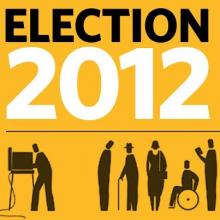Voting
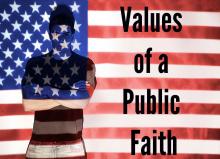
Editor's Note: This is part three of a three-part series from Dr. Miroslav Volf an a voice instructing us how to involve our values into our present politcal debates. To read part one go HERE and part two HERE.. From part one:
In this year of presidential elections, I have decided to summarize key values that guide me as I decide for whom to cast my vote. ...
14. Equality of Nations
Value: No nation represents an exception to the requirements of justice that should govern relations between nations. America should exert its unique international power by doing what is just and should pursue its own interests in concert with other nations of the world.
Rationale: “In everything do to others as you would have them do to you; for this is the law and the prophets” (Matt. 7:12).
Debate: The debate should not be whether America is somehow exceptional (and therefore permitted to do what other nations are not—for instance, carrying out raids on foreign soil in search of terrorists). The debate should, rather, be about what it means for the one remaining superpower to act responsibly in the community of nations.
Question to Ask: At the international level, would the candidate renounce a double moral standard: one for the U.S. and its allies and another for the rest of the world? Even when the candidate considers an American perspective morally superior, will he seek to persuade other nations of the moral rightness of these values rather than imposing them on other nations?
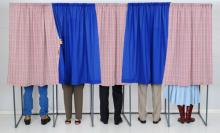
In a few weeks citizens will choose who serves as president of the United States. As many from all sides of the political spectrum have already recognized, the nationwide decision of Nov. 6 will affect the direction of 50 states – as well as the international community – for generations to come.
Since the opposing candidates offer contrasting views for the future, the choice is indeed critical, thus all are encouraged to listen openly and attentively, critique the various policy positions carefully, and when the first Tuesday of November arrives, make an informed choice for the collective benefit of our global common good.
While one should affirm and appreciate the importance of Election Day, we should also recognize and appreciate our ability to shape society far more frequently than once every four years. While several years pass between presidential elections, we vote for the collective benefit of our global common good on numerous occasions with each passing day.

Young millennials — age 18 to 25 — are more comfortable with an evangelical than Mormon (or atheist or Muslim) president. This, according to part two of the Millennial Values Survey put out by the Public Religion Research Institute and Georgetown University’s Berkley Center.
Nearly six in 10 of those surveyed say they would be comfortable with an evangelical Christian serving as president, while 44 percent would be comfortable with a Mormon.
The numbers line up with those supporting President Barack Obama over Gov. Mitt Romeny at 55 percent to 39 percent — a spread that has actually increased 16 points since March.
But that won’t necessarily convert into votes. Nearly two-thirds of those surveyed are registered to vote, but only half report they are absolutely certain they will cast a vote in November.
The candidates’ religion isn’t the only factor affecting young peoples’ voting patterns. Another issue is a lack of voter engagement in the political process altogether.
“Millennials have a reputation for being the ‘wired’ generation, but when it comes to government, they’re unplugged,” said Daniel Cox, PRRI research director, in the news release Friday. “Across a range of measures, younger millennials indicated that they are disillusioned with the government’s ability to respond to their needs.”
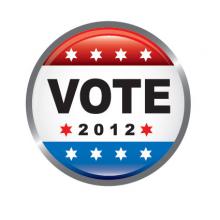
Editor's Note: This is the third article in Lisa Sharon Harper’s election season blog series, Watch the Vote. You can read the last article here.
With 28 days to go until our nation chooses its 45th president, a string of court victories have knocked down Jim-Crow-style barriers to voting that have been erected in states across the nation. But 13 states are still under the oppressive weight of laws designed to suppress the vote.
According to the Brennan Center for Justice, starting in early 2011, 41 states introduced legislation to restrict voting laws. Nineteen quietly passed 25 laws and two executive actions, some of which require government-issued photo IDs, proof of citizenship, fewer early-voting days, the elimination of Election Day voter registration, created barriers to voter registration drives, and created more obstacles for citizens with past criminal convictions.
The good news is that over the past few months we have seen one court case after another block the enactment of the worst provisions of these new Jim Crow laws. According to a recent Brennan Center study, 10 courts have blocked or blunted restrictive voting laws — and the Department of Justice blocked one more — since Oct. 3.
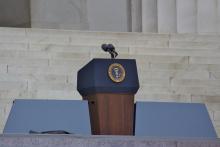
[editor's note: This article was originally published in 2012. References to elections or politicians without specific dates attached are in the context of the 2012 election cycle.]
AS I CAREFULLY watched both the Democratic and the Republican conventions this summer, I realized, once again, how challenging and complicated it is to bring faith to politics.
For example, the phrase “middle class” was likely the most repeated phrase at the conventions. And even though both parties are utterly dependent on their wealthy donors (a fact they don’t like to talk about), they know that middle-class voters will determine the outcome of the election. Now, I believe a strong middle class is good for the country, but Jesus didn’t say, “What you have done for the middle class, you have done for me.” Rather, Matthew 25 says, “What you have done to the least of these, you have done to me.”
When your first principle for politics is what happens to the poor and vulnerable—and I believe that is the first principle for Christians—you keep waiting at conventions for those words and commitments. There were a few moments when the poor were briefly mentioned, but it certainly wasn’t a strong theme in Tampa or Charlotte. “Opportunity” for the middle class was an important word in both conventions this year, but Christians must be clear that creating new opportunities for poor children and low-income families is critical to us.
The conventions also talked a great deal about “success,” but how we define that is very important. Is success mostly about how much money we make, defining the “American Dream” as being able to pass on more riches to our children than what our parents passed on to us? Or is success measured by how we as a nation prioritize, in our spending and political choices, the sick, the vulnerable, the weak, and the elderly? Is it determined more by the values we pass on to our children—evaluating our lives, and theirs, by how much we are able to help others?
America is a nation of immigrants, and how we welcome “the stranger” in our midst is another Christian principle for politics. So is our racial diversity as a nation, where all our citizens must be treated as having equal value. The most inspiring stories at the conventions for me came when that diversity was evidenced on the stage—from a young undocumented “dreamer” and a black first lady on the platform at the Democratic convention to Condoleezza Rice telling her fellow Republicans how a little girl from a segregated Southern city became secretary of state. But little mention was made at either convention of the racial disparities in America’s burgeoning prison industry or voting suppression efforts that most affect minorities and people who are poor.
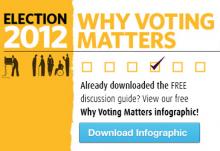
At its best, Christian faith provides a moral compass for advancing the common good. At worst, Christianity can be hijacked by partisan political agendas that divide and destroy. Sojourners encourages you to develop a robust and well-informed conscience around elections, measuring candidates and their platforms against Christian ethics and values. While we must be careful about translating scripture directly into public policy positions, there are principles and suggested approaches on a range of issues that can provide a critical framework to shape our perspective on public policy.
As we have since 2004, Sojourners has published an issues guide of principles and policies for Christian voters. We encourage you to use this guide to educate yourself on these issues. This can inform you as you write letters to candidates or to your local newspaper, call radio talk shows, and ask candidates at forums or town hall meetings questions based on these principles. Think and pray about whom, you would entrust with the responsibility to lead your community, state, and nation.

This anniversary may have passed you by, but on this day in 1919, The US Senate passed the 19th Amendment. Almost seventeen months after being introduced by the House of Representatives, women were given the right to vote.
It reads:
The right of citizens of the United States to vote shall not be denied or abridged by the United States or by any State on account of sex. Congress shall have power to enforce this article by appropriate legislation.
And after the 15th and19th amendment passed, voting rights are signed, sealed, delivered, right?

On Thursday, Sojourners launched its 2012 election campaign, Voting For Us, and the Public Religion Research Institute and Berkley Center released its “2012 Millennial Values Survey.” Young Christians, and particularly young evangelicals are a significant demographic to understand. They could be a large “persuadable” population in the run up to the November elections.
What do they believe? What are their priorities? How will they vote?
Young evangelicals are different from their parents and any generation that has preceded them. Their priorities are changing, their world view is shifting and their political engagement is becoming increasingly nuanced – going well beyond the narrow interests of the Religious Right that until now have been associated with evangelicalism in the United States.
More than 5 million voters could be affected by new Voter-ID laws and (coincidentally?) a disproportionate number of them are people of color.
The Iowa Caucus is today and the nation is watching. It’s a lot of attention for a relatively small part of the nation voting. Having grown up in New Hampshire, I know that kind of limelight well.
When I was a pretentious 11 year old, I wasn’t able to vote but nonetheless assumed I had the right to meet every candidate who was seeking their party’s nomination. When President Bill Clinton came through the state I remember being particularly annoyed that he just drove by and waved instead of talking with me.
I still haven’t let that one go.
There are a lot of concerns about the undue influence early voting states wield in the primary process. The fact that I got more face time with candidates as an elementary school pupil than most voters will get in a lifetime is problematic.
Initial results from Egypt’s first round of elections produced an unexpectedly large showing for Islamists. The Freedom and Justice Party of the Muslim Brotherhood gained approximately 37 percent of the seats selected from political party lists, in line with predictions. The real shocker was the 24 percent vote obtained by the al-Nur party of the Salafi movement. The Salafis are extreme conservatives who favor restrictions on the role of women and Saudi-style controls on public morality. Liberal-left parties in the various party blocs gained about 37 percent. The results are very preliminary, with two more rounds of voting still ahead.

In 'God's Country': Voting Wallets Over Religion. Why Evangelicals Forgive (Republican) Sex Scandals. The Gospel According To Herman Cain. Pope Asks African Catholics To Be ‘Apostles Of Reconciliation.’ Super Screwed. Congress May Try Blocking Cuts If Debt Panel Fails. Too Much Violence And Pepper Spray At The OWS Protests: The Videos And Pictures.
 The puzzle here is not that readers of the Bible would tilt toward the political left. That, for me, as well as for thousands of other American evangelicals, is self-evident. Jesus, after all, summoned his followers to be peacemakers, to turn the other cheek, to welcome the stranger and to care for “the least of these.” He also expressed concern for the tiniest sparrow, a sentiment that should find some resonance in our environmental policies.
The puzzle here is not that readers of the Bible would tilt toward the political left. That, for me, as well as for thousands of other American evangelicals, is self-evident. Jesus, after all, summoned his followers to be peacemakers, to turn the other cheek, to welcome the stranger and to care for “the least of these.” He also expressed concern for the tiniest sparrow, a sentiment that should find some resonance in our environmental policies.
No, the real conundrum lies in the subtitle the editors of Christianity Today assigned to Franzen’s article, which was titled, “A Left-Leaning Text.” Adjacent to a picture of a Bible tilted about 45 degrees to the left, the editors added the subtitle: “Survey Surprise: Frequent Bible reading can turn you liberal (in some ways).”
The fact that anyone should register surprise that the Bible points toward the left should be the biggest surprise of all.

In his column last week, Sojourners chief Jim Wallis talked about his frustration with the perennial misuse of the word "evangelical" by various media to describe folks and ideas that, in his view, and that of many of us who self-describe as evangelicals, don't bear any resemblance to what we understand that term to actually mean.
Below is a compilation of recent media reports where the word "evangelical" is invoked. When you read these, evangelical brothers and sisters, do you recognize yourself in how the word is used and defined? Or does it ring false to you and your understanding of what "evangelical" really and truly means?
We have come to an impasse in the negotiations to raise the debt ceiling because of several conceptual errors in our public discourse. These errors were most glaring in the remarks recently delivered by Speaker of the House John Boehner in his response to President Obama. The largest conceptual error is the idea that the government of a constitutional representative democracy is different from the people. Boehner said, "You know I've always believed the bigger the government, the smaller the people."
What does this mean? The government is composed of the people, and if people are paying attention and voting according to their own interests, the government ought to work toward the happiness of the people. The problem is that too many Americans have bought into this conceptual error that the government is some kind of leviathan, a monster that exists to take away their liberties. This is nonsense. A correction of another conceptual error in Boehner's presentation makes my point.
New software may help the public have a greater voice in the crucial redrawing of voting districts.
